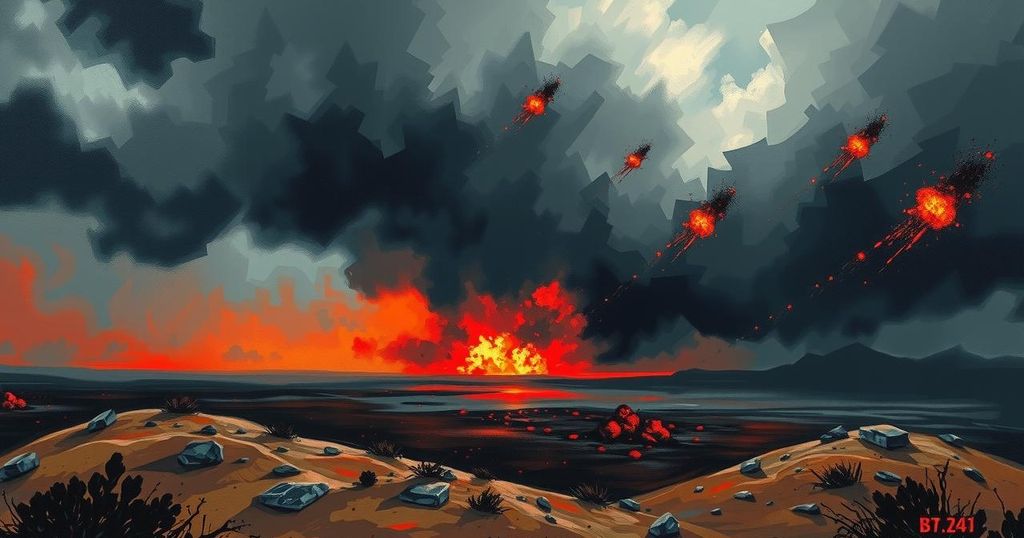U.S. Military Strikes on Yemen’s Houthis Result in Casualties and Escalation of Tensions
U.S. President Donald Trump initiated extensive military strikes against the Houthis in Yemen, resulting in 31 deaths. He warned Iran to discontinue support for the group and threatened significant repercussions for any challenges to U.S. authority. The strikes mark a notable escalation in U.S. military operations in the region and reflect a shift in policy from previous administrations, amidst ongoing Iranian missile capabilities concerns.
On Saturday, U.S. President Donald Trump authorized significant military strikes against Yemen’s Houthi group, aligned with Iran, due to their ongoing attacks on shipping in the Red Sea. These strikes resulted in at least 31 fatalities, marking the onset of an extended military operation. Trump issued a stern warning to Iran, demanding cessation of support for the Houthis, stating that any threats to the U.S. would result in serious repercussions.
In response, Iranian Revolutionary Guards Commander Hossein Salami proclaimed that the Houthis operate independently, asserting that Iran would retaliate decisively against any threats. The coordinated strikes, which some officials indicate could persist for weeks, represent the largest U.S. military engagement in the Middle East since Trump ascended to the presidency.
Trump’s warning was emphatic: “To all Houthi terrorists, YOUR TIME IS UP…” he declared on his social media platform, calling for an immediate halt to their attacks. According to Houthi health ministry spokesperson Anees al-Asbahi, many casualties included women and children. The Houthi political bureau condemned the strikes as a “war crime,” emphasizing their readiness to retaliate.
Witnesses described the strikes in Sanaa as catastrophic events, with one resident likening the explosions to an earthquake. Additional military actions targeted Houthi installations in Taiz and affected a power station in Saada, leading to significant disruptions. The Houthis have recently intensified attacks on maritime vessels, disrupting shipping and prompting a costly U.S. military response involving air defenses.
The Pentagon reported numerous attacks on U.S. and commercial ships attributed to the Houthis since late 2023, attributing their actions to solidarity with Palestinians amid the conflict in Gaza. The current U.S. administration has adopted a much more aggressive military strategy, diverging significantly from the previous administration’s approach, which had sought to limit military engagement.
The strikes were part of a large-scale campaign initiated by U.S. military Central Command, utilizing aircraft from the aircraft carrier Harry S. Truman. Defense Secretary Pete Hegseth emphasized that attacks on American assets would not be tolerated. In contrast, Iran’s foreign ministry condemned the U.S. actions as violations of international law, insisting that the U.S. has no authority to dictate Iranian policies.
Furthermore, the Houthis announced their intention to resume attacks on Israeli vessels, marking a significant escalation. The U.S. strikes coincided with communication efforts regarding Iran’s nuclear program, which Tehran has wholly rejected. Amid rising public discontent in Iran, the situation remains tense, with both regional and global implications as U.S. officials engage with other nations regarding this unfolding crisis.
In conclusion, the recent military strikes by the United States against Yemen’s Houthis signify a pivotal moment in U.S.-Middle Eastern relations under President Trump. The strikes, which have led to significant casualties and regional tensions, reflect a robust response to threats against maritime safety and U.S. interests. Both the U.S. and Iran remain engaged in a high-stakes confrontation, with escalating military actions and warnings from both sides. The implications of these events will likely resonate internationally, especially concerning stability in the region and the ongoing tensions surrounding Iran’s nuclear ambitions.
Original Source: www.cnbc.com




Post Comment